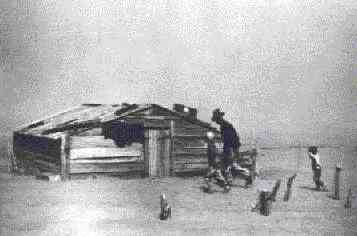






CHORUS:
"So long, it's been good to know yuh;
So long, it's been good to know yuh;
So long, it's been good to know yuh.
This dusty old dust is a-gettin' my home,
And I got to be driftin' along."
A dust storm hit, an' it hit like thunder;
It dusted us over, an' it covered us under;
Blocked out the traffic an' blocked out the sun,
Straight for home all the people did run,
Singin':
[CHORUS]
We talked of the end of the world, and then
We'd sing a song an' then sing it again.
We'd sit for an hour an' not say a word,
And then these words would be heard:
[CHORUS]
Sweethearts sat in the dark and sparked,
They hugged and kissed in that dusty old dark.
They sighed and cried, hugged and kissed,
Instead of marriage, they talked like this:
"Honey..." [CHORUS]
Now, the telephone rang, an' it jumped off the wall,
That was the preacher, a-makin' his call.
He said, "Kind friend, this may the end;
An' you got your last chance of salvation of sin!"
[CHORUS]
The churches was jammed, and the churches was packed,
An' that dusty old dust storm blowed so black.
Preacher could not read a word of his text,
An' he folded his specs, an' he took up collection,
Said:
[CHORUS]


